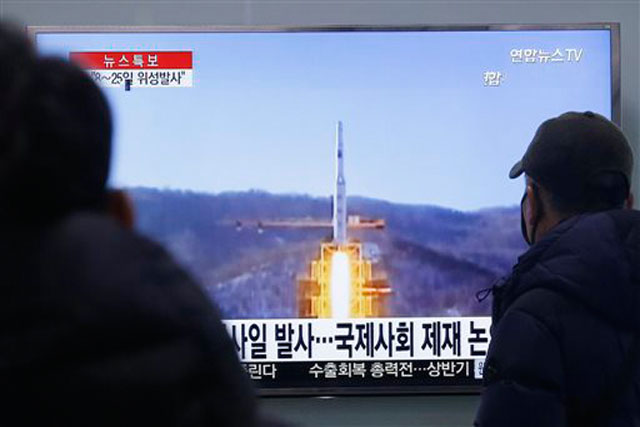Philippines backs UN ban on nuclear weapons

The treaty was adopted by a vote of 122 in favor with one country – NATO member the Netherlands – voting against, while Singapore abstained. AP/Ahn Young-joon, File
NEW YORK – A global treaty banning nuclear weapons was adopted at the United Nations by 122 nations, including the Philippines, on Friday despite opposition from nuclear powers Britain, France and the US, which said it disregards the reality of dealing with international security threats such as North Korea.
The treaty was adopted by a vote of 122 in favor with one country – NATO member the Netherlands – voting against, while Singapore abstained.
None of the nine countries that possess nuclear weapons – Britain, China, France, India, Israel, North Korea, Pakistan, Russia and the US – took part in the negotiations or the vote.
Even Japan – the only country to have suffered atomic attacks, in 1945 – boycotted the talks, as did most NATO countries.
The Philippines is among 122 countries that voted in favor of the treaty to ban nuclear weapons.
“This treaty is the capstone of the global disarmament architecture,” Philippine representative to the UN Teodoro Locsin Jr. said after the conference that adopted the treaty in New York on Friday.
“It strengthens the existing network of treaties and agreements already in place by reaffirming their collectively compelling logic of survival. We voted for its adoption because it is the right thing to do,” he said.
The Department of Foreign Affairs said the treaty fills the legal gap in the existing disarmament architecture that has delegitimized chemical and biological weapons.
Under the treaty, UN member-states are prohibited from developing, testing, producing, manufacturing, acquiring, possessing or stockpiling nuclear weapons or other nuclear explosive devices.
They are also banned from using or threatening to use nuclear weapons and explosive devices.
The Philippines participated in the negotiations, guided by a provision in the Constitution that prohibits nuclear weapons within the country’s territory.
Applause and cheers broke out in a UN conference hall following the vote that capped three weeks of negotiations on the text providing for a total ban on developing, stockpiling or threatening to use nuclear weapons.
Rejected
Within hours of its adoption, the US, Britain and France rejected the treaty and said they have no intention of joining it.
“This initiative clearly disregards the realities of the international security environment,” said the UN ambassadors from the three countries.
“This treaty offers no solution to the grave threat posed by North Korea’s nuclear program, nor does it address other security challenges that make nuclear deterrence necessary,” they said in a joint statement.
North Korea marked a worrying milestone in its drive to develop nuclear weapons when it tested its first intercontinental ballistic missile this week.
Nuclear powers argue their arsenals serve as a deterrent against a nuclear attack and say they remain committed to gradual approach to disarmament outlined in the nuclear Non-Proliferation Treaty (NPT).
The decades-old NPT seeks to prevent the spread of atomic weapons but also puts the responsibility on nuclear states to reduce their stockpiles.
Impatience, however, is growing among many non-nuclear states over the slow pace of disarmament, as are worries that weapons of mass destruction will fall into the wrong hands.
Delegitimizing nuclear weapons
Led by Austria, Brazil, Mexico, South Africa and New Zealand, 141 countries joined in drafting the treaty that they hope will increase pressure on nuclear states to take disarmament more seriously.
Ireland, Sweden and Switzerland voted in favor, as did Iran, Iraq, Egypt, Kazakhstan and many African and Latin American countries.
“We have managed to sow the first seeds of a world free of nuclear weapons,” said Costa Rica’s ambassador, Elayne Whyte Gomez, the president of the UN conference that negotiated the treaty.
The International Committee of the Red Cross hailed the treaty as a “historic step toward delegitimizing” nuclear weapons and declared the adoption “an important victory for our shared humanity.”
Welcoming “an important step” toward a nuclear-free world, UN Secretary-General Antonio Guterres said the treaty reflects growing “awareness of the catastrophic humanitarian consequences” of a nuclear war.
Disarmament campaigners say the treaty will increase the stigma associated with nuclear weapons and have an impact on public opinion. – AFP, Janvic Mateo
- Latest
- Trending



























